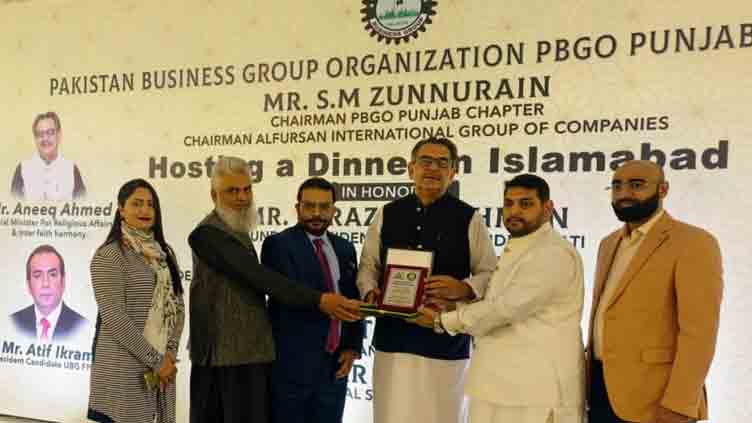Aneeq to reveal Hajj Policy 2024 by Wednesday, promising reduced cost for pilgrims

Pakistan
He additionally guaranteed that pilgrims would experience maximum convenience during this season
ISLAMABAD (APP) - Minister for Religious Affairs and Interfaith Harmony, Aneeq Ahmed, called upon the business community to refrain from disseminating negative information about the current economic state, whether in public discourse or through media channels.
Addressing a dinner reception, organized by the Pakistan Business Group Organization (PBGO) Punjab Chapter the other day, he emphasized the need for a positive approach and concrete actions, urging them to inspire hope among the public, motivating them to harness their full potential to address prevailing challenges and elevate Pakistan’s economy to international standards.
Minister Aneeq clarified that commerce, industry, or finance did not fall within his purview, however, regarding the Ministry of Religious Affairs, indicated his intention to announce the Hajj Policy by the upcoming Wednesday.
He emphasized the consistent adherence to the Hajj Policy since 2004, underscoring the importance of respecting and implementing the directives of the Saudi government both in letter and spirit.
Highlighting a notable accomplishment of his government, Minister Aneeq disclosed that the forthcoming Hajj pilgrimage would incur a reduced cost, now standing at less than Rs. 1,075,000, compared to the previous pilgrimage which incurred expenses of Rs. 1,175,000.
He additionally guaranteed that pilgrims would experience maximum convenience and comfort during this Hajj season, with a range of facilities, including an affordable internet data package with a private network SIM available throughout their 45-day stay in the Kingdom of Saudi Arabia.
The ministry was introducing a short-term Hajj programme spanning approximately 20 days, recognizing the constraints faced by some pilgrims who are unable to stay for more than 40 days due to personal and professional commitments, he added. Minister Aneeq shared uplifting news for prospective pilgrims paying their Hajj dues in dollars, stating that they would be exempt from the balloting process.
This exemption, he highlighted, aimed to streamline the Hajj process effectively. He emphasized that every pilgrim would receive a suitcase equipped with a QR code, ensuring the secure tracking of both their luggage and themselves throughout the entire Hajj operation. In conclusion, he outlined the ministry’s initiative to maintain discipline among female pilgrims by providing a scarf (Hijab) adorned with the national flag on their back.
Meanwhile, Chairman of Alfursan Group of Companies, S.M. Zunnurain, emphasized the need for the government to develop a comprehensive 10-year business policy. He said this strategic initiative could facilitate the evolution of small and midsize enterprises into the corporate sector, enhancing their competitiveness within the region. He highlighted that such a long-term business policy holds the potential to stimulate economic activities and contribute to the overall financial stability of the country.
He expressed concern over the inconsistency in policies that occurs with changes in government, stating that this approach frustrates the business community and introduces obstacles to the smooth operation of businesses.
By advocating for a stable and enduring business framework, Zunnurain envisioned a landscape where businesses could thrive, promoting sustained economic growth and fostering a conducive environment for both businesses and investors. Former President of the Islamabad Chamber of Commerce and Industry, Zafar Bakhtawari endorsed the proposal for a comprehensive long-term economic policy.
He emphasized the imperative for political parties to unite and collaborate on a ‘Charter of Economy,’ highlighting its potential to serve the broader national interest. He underscored that a sustained national economic policy would instil confidence not only in local but also in foreign investors.
Recognizing the vast potential across various economic sectors, he emphasized the necessity for unity, urging the removal of differences stemming from sectarianism, politics, and linguistics to fully realize these opportunities. In condemning the ongoing atrocities in Palestine and the Indian Illegally Occupied Jammu and Kashmir, Bakhtawari acknowledged the economic challenges faced by Pakistan.
He recognized that the nation’s current economic condition hindered the ability to take practical steps to alleviate the plight of oppressed Muslims in these regions. President of the Korangi Association of Trade & Industry, Faraz-ur-Rehman, explaining the vision of the Pakistan Business Group Organization, committed to consolidating the entire trader community on a unified platform to navigate Pakistan through its current economic challenges.
In elucidating his mission, he underscored the significance of integrating young entrepreneurs across diverse economic sectors, foreseeing substantial achievements not only in local markets but also on the global stage.
He emphasized the imperative to nurture and promote young business leaders, harnessing their untapped potential to transform Pakistan’s economy into a success story. Subsequently, Minister Aneeq presented shields to the representatives of Hajj Group Operators on behalf of the PBGO, aiming to recognize their achievements, motivate them for ongoing excellence, and inspire continuous improvement in their services for the future.


